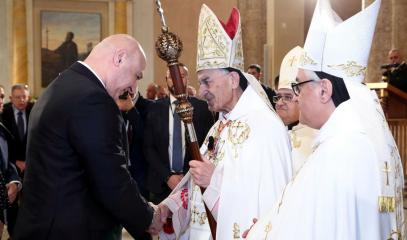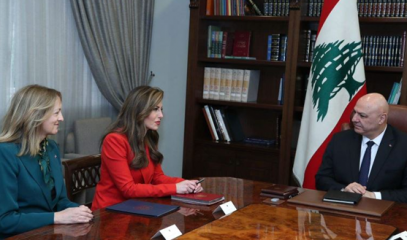The new, Saudi-friendly Salam government marks the end of Iranian hegemony
The new cabinet, even with a minister from Amal (at Finance), marks the end of Tehran’s hold on to Lebanon. The agenda of the new government includes implementing Resolution 1701 and the ceasefire with Israel. Finding a solution to the failure of the banks is also a priority.
Beirut (AsiaNews) – Following the election of President Joseph Aoun on 9 January, a new Lebanese government led by Nawaf Salam, former president of the International Court of Justice, was formed on Saturday (8 February) after several weeks of difficult negotiations. This development puts an end to more than two years of caretaker governance and consecrates the end of Iranian hegemony in Lebanon.
The weakening of Hezbollah, which suffered considerable losses in the war with Israel, and the fall of Bashar al-Assad's dictatorship in Syria, allowed the election of the former Commander of the Lebanese Armed Forces Joseph Aoun, viewed as Washington's preferred candidate, and the selection of Nawaf Salam as prime minister.
The US embassy welcomed the formation of the new government, hoping that it will “implement the necessary reforms". Upon her arrival in Lebanon on Monday, Morgan Ortagus, US Deputy Envoy to the Middle East to Steve Witkoff, warned, after meeting with President Joseph Aoun, against any presence of Hezbollah in the government, noting that it was "defeated" by Israel.
The president skilfully tipped around this blatant interference in Lebanon's internal affairs, which incensed Hezbollah, by issuing a statement saying that Ms Ortegus' remarks represent “her own point of view”.
In fact, former lawmaker Yassin Jaber, who has close ties to the Shia Amal movement, a Hezbollah ally, was appointed to the strategic finance portfolio. Some see this as a concession to the pro-Iranian party, but parliamentary circles note that Jaber is "a man of high competence and integrity, who also enjoys dual Lebanese and American nationality and often stays in the United States".
While the two Shia parties were able to get the finance ministry, they are far from controlling the new cabinet. In fact, Salam has kept his promise to remove members of political parties and anyone planning to run in the legislative elections of May 2026. The cabinet’s make-up is such to prevent any internal blockage, unlike the criteria adopted in Doha (Qatar) in 2008, under pressure from the then all-powerful Hezbollah.
Samir Geagea's Lebanese Forces have obtained five portfolios, including the very strategic Ministry of Foreign Affairs, as well as Energy and Telecommunications, two portfolios that should play a key role in implementing reforms expected by ordinary Lebanese and the international community. However, Sleiman Frangieh's Marada and Gebran Bassil's Free Patriotic Movement were excluded.
Projects in the works
The new, 24-member cabinet has five women (against only one in the old one) as well as "heavyweights" like former ministers Ghassan Salamé and Tarek Mitri, both of whom served as representative of the UN secretary-general in the Maghreb.
In a televised statement, the prime minister said he would work to "restore trust between citizens and the state, between Lebanon and its Arab neighbours, and between Lebanon and the international community".
President Joseph Aoun is due to inaugurate the programme with a first trip to Saudi Arabia, a necessary step towards getting the funds needed to rebuild and towards reconciliation with the Kingdom that Hezbollah's hostility had alienated, and whose return to the Lebanese scene the new government is consecrating.
The restoration of confidence also involves three major urgent projects: the implementation of Resolution 1701 and the reconstruction of devastated border villages, the investigation into the port explosion of 4 August 2020, put on hold under pressure from Hezbollah, and the reform of the banking sector.
The Israeli withdrawal from the villages and areas it still occupies in southern Lebanon is the most pressing issue. It is due to take effect on 18 February and is likely to see the Jewish state try to keep a military presence on certain strategic hills, to ensure that Hezbollah cedes all its positions to the Lebanese army, south of the Litani River line, in accordance with Resolution 1701.
Nawaf Salam's government will finally have the difficult task of finding a solution to the failing banking system that has deprived tens of thousands of Lebanese of their savings since 2019.
The new government will have to carry out a transparent audit of the accounts of the Bank of Lebanon in accordance with the IMF's wishes, a move that the authorities concerned have resisted since 2019 for fear of scandalous revelations about the extent of corruption within the institutions.
However, this truth operation is the only way to get international funds needed to rebuild and stimulate an economy that has been on the rocks since 2019.
The inaugural meeting of the Council of Ministers will be held tomorrow, Tuesday, but before the new government can exercise its powers, it must draft a ministerial declaration that must be submitted to a vote of confidence in Parliament within 30 days.
The statement should clarify whether Resolution 1701 recommends the partial or total disarmament of Hezbollah. From the outcome of this expected tug-of-war, Lebanese will know whether the country has definitively shed itself of Iranian influence or not.









.png)










